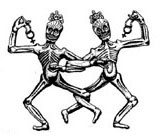
Those Misleading “Leading Theologians”
PRIDE & A PREJUDICE FOR THE FASHIONABLE
“Leading scholar,” “leading writer,” and the like are familiar terms. They suggest distinction and accomplishment. But the image they convey is incomplete. To be “leading” is, after all, to be leading someone or something somewhere. A little thought makes it evident that to call someone a “leading” figure is not simply to recognize achievement but also to imply responsibility. And what is the responsibility of a true leader? Paradoxically enough, it is to be a true follower — to follow the true path and thus to lead in the right direction.
In the Catholic Church we have “leading theologians,” and in the past three decades or so we laity, even if we do not know a Dyophysite from a Monophysite or the Council of Chalcedon from the Council of Trent, have learned to ask just where it is that our leading experts are leading us.
I recall that in 1967 I joined a training class for laymen who would teach CCD classes for children. Our instructor was a theologian appointed by the diocese who early in the course made a strange statement. He informed us that one deficiency in “Catholics today” is that they tend to overemphasize the divinity of Christ and neglect His humanity. It followed that in modern catechesis more stress needed to be laid on His humanity.
This sounded to me not only wrong, but diametrically wrong. Had he looked around him? The modern world, persuaded to a comfortable materialism by a false scientism claiming to be true science, prides itself on accepting only what seems verified empirically. The Church’s assertion of Jesus’ divinity is, strictly speaking, neither scientifically nor historically verifiable (were it verified, everyone would be a believer), and even His humanity is subject to perennial skepticist arguments that He was only a legend. The humanity of Jesus might be the one thing modern man would concede Him, but certainly nothing more, so why should catechesis emphasize His humanity? It seemed to me then (as it still seems) that getting people to believe in the divinity of Christ is the most basic of all the tasks of Christian apologetics and evangelization. Sincerely puzzled to hear a Catholic teacher assert that stressing Christ’s divinity is a “problem,” I attempted to convey my concerns to my teacher, to “dialogue” with him, for he had presented himself as a believer in dialogue. But he simply was not interested in my viewpoint. So much for dialogue!
You May Also Enjoy
Many bishops have been complaining that Rome treats them like children.
The figures are telling: two million Iraqis are displaced internally and two million others have already fled the country.
The Church has attempted to correct the excesses of radical liberation theology and that “dualistic” Christianity that views the Church as a fortress and calls on Christians to retreat within its walls.

